Serving 761 students in grades 6-8, John Hanson Middle School ranks in the bottom 50% of all schools in Maryland for overall test scores (math proficiency is bottom 50%, and reading proficiency is bottom 50%).
The percentage of students achieving proficiency in math is 7% (which is lower than the Maryland state average of 25%). The percentage of students achieving proficiency in reading/language arts is 27% (which is lower than the Maryland state average of 45%).
The student:teacher ratio of 13:1 is lower than the Maryland state level of 14:1.
Minority enrollment is 91% of the student body (majority Black), which is higher than the Maryland state average of 68% (majority Black).
Quick Stats (2025)
- Grades: 6-8
- Enrollment: 761 students
- Student:Teacher Ratio: 13:1
- Minority Enrollment: 91%
- Overall Testing Rank: Bottom 50% in MD
- Math Proficiency: 7% (Btm 50%)
- Reading Proficiency: 27% (Btm 50%)
- Science Proficiency: 20% (Btm 50%)
- Source: National Center for Education Statistics (NCES), MD Dept. of Education
School Overview
John Hanson Middle School's student population of 761 students has declined by 7% over five school years.
The teacher population of 59 teachers has grown by 11% over five school years.
Grades Offered
Grades 6-8
(offers virtual instruction)
(offers virtual instruction)
Total Students
761 students
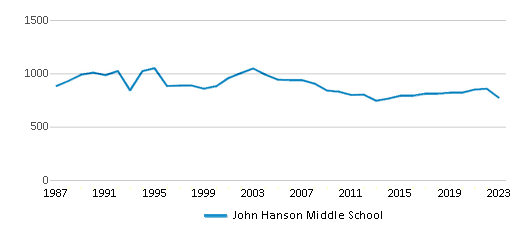
Gender %
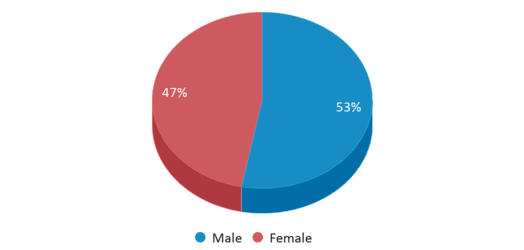
Total Classroom Teachers
59 teachers
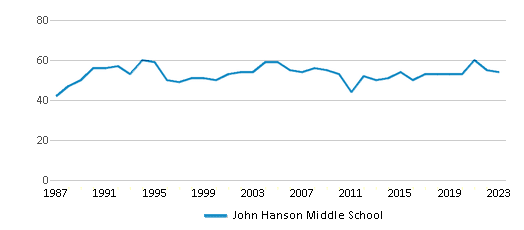
Students by Grade
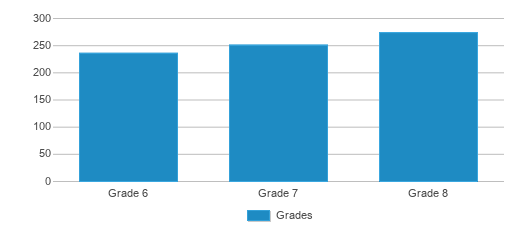
School Rankings
John Hanson Middle School ranks within the bottom 50% of all 1,347 schools in Maryland (based off of combined math and reading proficiency testing data).
The diversity score of John Hanson Middle School is 0.58, which is less than the diversity score at state average of 0.74. The school's diversity has stayed relatively flat over five school years.
Overall Testing Rank
#1089 out of 1347 schools
(Bottom 50%)
(Bottom 50%)
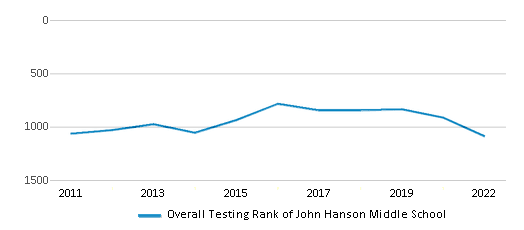
Math Test Scores (% Proficient)
7%
25%
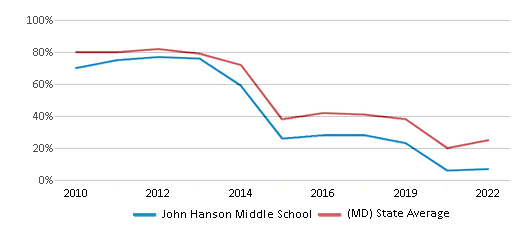
Reading/Language Arts Test Scores (% Proficient)
27%
45%
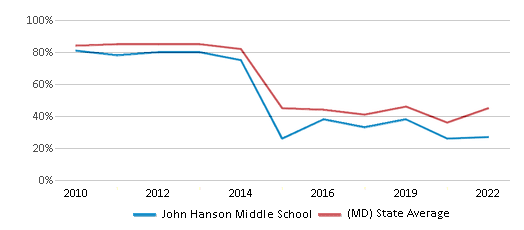
Science Test Scores (% Proficient)
20%
36%
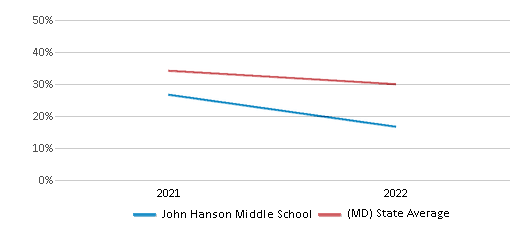
Student : Teacher Ratio
13:1
14:1
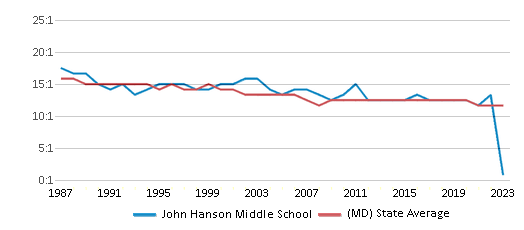
American Indian
1%
n/a
Asian
2%
7%
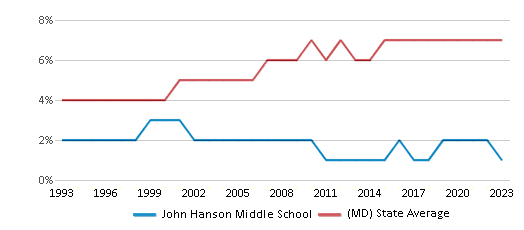
Hispanic
17%
23%
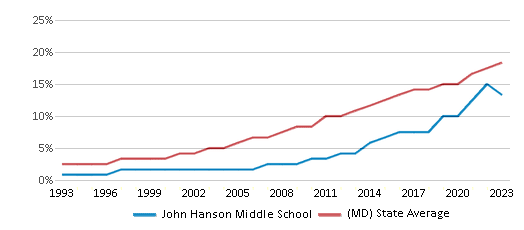
Black
62%
33%
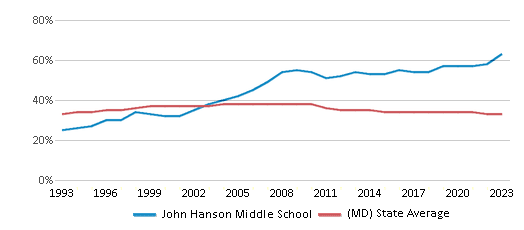
White
9%
32%
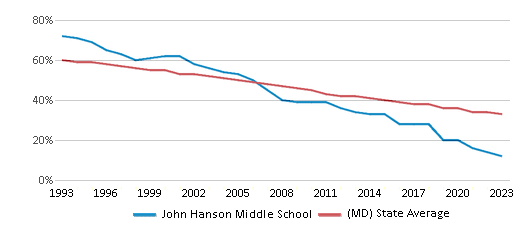
Hawaiian
n/a
n/a
Two or more races
9%
5%
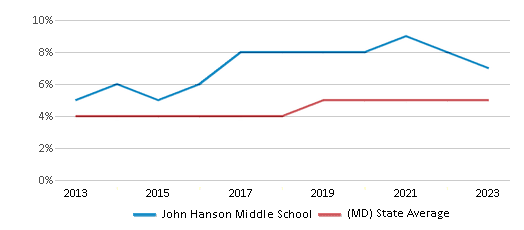
All Ethnic Groups
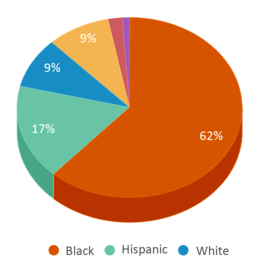
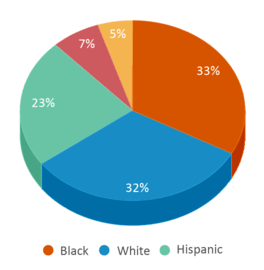
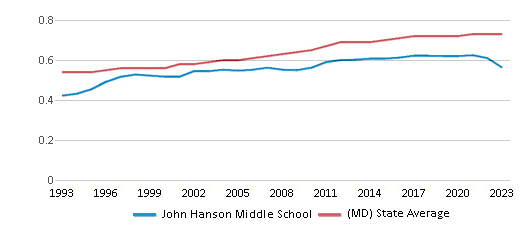
Participates in the National School Lunch Program (NSLP)
Yes
Eligible for Free Lunch
53%
44%
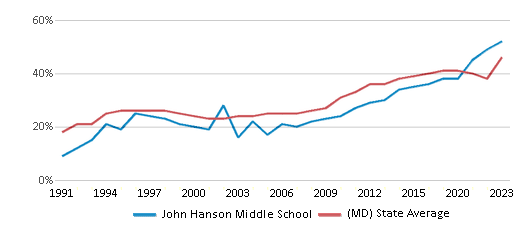
Eligible for Reduced Lunch
8%
5%
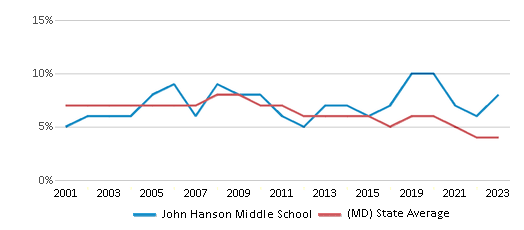
School Statewide Testing
School District Name
Source: National Center for Education Statistics (NCES), MD Dept. of Education
Profile last updated: 02/09/2025
Frequently Asked Questions
What is John Hanson Middle School's ranking?
John Hanson Middle School is ranked #1089 out of 1,347 schools, which ranks it among the bottom 50% of public schools in Maryland.
What schools are John Hanson Middle School often compared to?
John Hanson Middle Schoolis often viewed alongside schools like Benjamin Stoddert Middle School, Mattawoman Middle School by visitors of our site.
What percent of students have achieved state testing proficiency in math and reading?
7% of students have achieved math proficiency (compared to the 25% MD state average), while 27% of students have achieved reading proficiency (compared to the 45% MD state average).
How many students attend John Hanson Middle School?
761 students attend John Hanson Middle School.
What is the racial composition of the student body?
62% of John Hanson Middle School students are Black, 17% of students are Hispanic, 9% of students are White, 9% of students are Two or more races, 2% of students are Asian, and 1% of students are American Indian.
What is the student:teacher ratio of John Hanson Middle School?
John Hanson Middle School has a student ration of 13:1, which is lower than the Maryland state average of 14:1.
What grades does John Hanson Middle School offer ?
John Hanson Middle School offers enrollment in grades 6-8 (offers virtual instruction).
What school district is John Hanson Middle School part of?
John Hanson Middle School is part of Charles County School District.
School Reviews
5 12/8/2017
good school
2 5/17/2016
Clearly from the post from this other student, they couldn't even teach them to spell. THERE***
The teachers are wonderful but a lot of the children that attend this school have no respect. Unless you want you children to be surrounded by other children that will bring them down I suggest moving. Its a reflection of the parents, while there are good you have a lot of bad.
2 12/6/2014
Unfortunately it seems most of the administration has given up and let the rowdy children who constantly disrupt class go ahead and do what they want. I feel genuinely sorry for any of the children there who want to learn because the majority of the students here have absolutely no respect for anyone. The lack of respect shown by these children is also a sad reflection on their families (parents, we HAVE to teach our children to be better than this!!) and I wish they would realize how they are making themselves look. Brushing off education to be one of the "cool kids" is not going to do them any favors in life.
5 9/26/2007
Well, i defintaly would recomend this school, i went their! I thought it taught me alot and the teachers are always willing to help. I didn't think the school was to strict on policies but when i got to high school, John Hanson really was pretty relaxed. I took chorus all three years and we took a lot of feild trips they were always fun. They do give awards but you do have to earn them. John Hanson isn't the most high tech school but my sister goes their now and it keeps improving. So if you want a good school with very willing teachers that teach the old fashion way with textbooks and with computers, this is your school
Review John Hanson Middle School. Reviews should be a few sentences in length. Please include any comments on:
- Quality of academic programs, teachers, and facilities
- Availability of music, art, sports and other extracurricular activities
Recent Articles

What Is A Charter School?
Explore the world of charter schools in this comprehensive guide. Learn about their history, how they operate, and the pros and cons of this educational innovation. Discover key facts about charter schools, including admission policies, demographics, and funding, as well as what to look for when considering a charter school for your child.

10 Reasons Why High School Sports Benefit Students
Discover the 10 compelling reasons why high school sports are beneficial for students. This comprehensive article explores how athletics enhance academic performance, foster personal growth, and develop crucial life skills. From improved fitness and time management to leadership development and community representation, learn why participating in high school sports can be a game-changer for students' overall success and well-being.

February 05, 2025
Understanding the U.S. Department of Education: Structure, Impact, and EvolutionWe explore how the Department of Education shapes American education, from its cabinet-level leadership to its impact on millions of students, written for general audiences seeking clarity on this vital institution.









